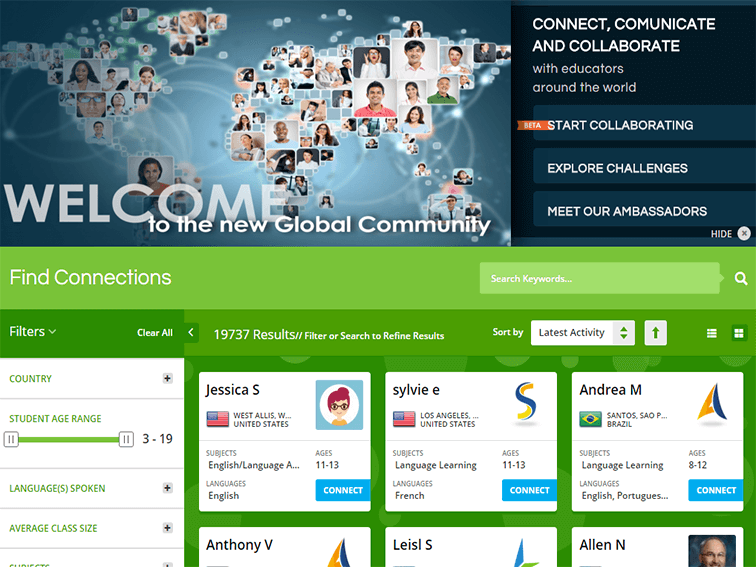
A Great Tool For Planning Global & Collaborative Project-Based Learning
by TeachThought Staff
From a press release
WASHINGTON, DC—January 12, 2016— How do the traits of hummingbirds, geckos, and other animals help scientists design robots? What can bird’s nest soup tell you about Chinese culture? How do images, color and text work together to communicate ideas that can change the world?
These are just a few examples of the high-interest, Experiences, or explorations, that students can work on collaboratively with peers in Afghanistan, Greece, Iceland, India, Italy and other countries around the world through the free ePals Global Community. A division of Cricket Media, ePals safely connects millions of students and teachers across 200 countries to reinforce culture, language, and subject-based learning.
Rich Critical Thinking Experiences
STEAM, English Language Arts, and Social Studies are among the core-curricular skills students practice within the larger context of cultural investigations on topics such as what it’s like to grow up in Turkey or Cambodia, the causes and effects of poverty globally, and how recipes from Spain, Russia, Holland and the American South reflect regional beliefs and customs.
ePals Experiences are designed to inspire, challenge and empower kids by opening their minds to new understandings and points of view,” says Cricket Media CEO, Katya Andresen. “When they collaborate on language learning or other activities with peers in places like Thailand or Argentina, these personal connections foster the global awareness and empathy called for in the 21st century.”
Real world and in-depth, the ePals project-based learning Experiences integrate high-quality educational content from Faces, Appleseed, Ask and Cricket’s eleven other reading-leveled media products, as well as multimedia resources from established experts such as McGraw Hill Education and the Smithsonian Institution.
Also available are shorter “lite” Experiences—such as playing and learning about games from other countries, exchanging folktales, and designing flags— that teachers can plug into their own instructional units or allow students to do as stand-alone projects.
Streamlined Teacher Connections
Revamped interface, navigation and connection capabilities now make it easier for teachers to search and find the right professional matches for collaborative classroom Experiences. Safety is ensured through ePals’ vetting of each individual registrant, and teachers can review colleagues’ profiles, see the dates and types of their latest projects, and reach out to connect.
Enhanced search functions make for efficient connections with more sophisticated and granular filters that include a broad range of criteria from subject and grade level, to country, language, specialization, class size, and more.
More Comprehensive Support Materials
Teacher materials created by the ePals team of education experts include clear Experience descriptions, standards-aligned objectives, step-by-step tasks, thought questions, collaborative activities, and homework suggestions. All content is easily customizable, so teachers can modify projects, add their own activities, and share their revisions with others. Experience summaries also offer a quick preview of what projects entail, and the time they take to complete. And margin notes provide tips on grouping students, goal-setting and how students can contribute their ideas and solutions to charities and other real-world organizations.
Coming Attractions!
This spring, users can also look forward to accessing Experience templates that allow them to create and submit their own Experiences for review and possible publication on the ePals platform. Later in 2016, new capabilities will also include digital student histories that track their Experience participation and accompany them from one grade level to the next throughout their K-12 years. Parents, care-givers and individual students will also be able to sign up to participate in collaborative experiences and other activities outside of school hours.
